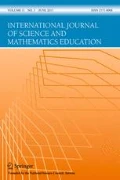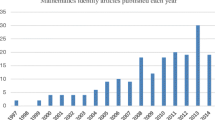Abstract
Mathematics education research has placed great emphasis on teacher identity, examining both pre- and in-service teachers, and within these cohorts, specialised mathematics teachers and non-specialists such as elementary teachers. Extensive research has already been done; hence, this paper discusses possible future directions for research on teacher identity in mathematics education. Among other issues, we highlight that general education research on identity has infrequently informed research on mathematics-related teacher identity. This not only limits the transfer of knowledge but also isolates mathematics education from general education research. We suggest that connecting these lines of research and their findings may not only strengthen mathematics education research and mathematics teaching and learning but also contribute to less isolation within the discipline as a whole.
Similar content being viewed by others
References
Andersson, A. (2011). A “curling teacher” in mathematics education: Teacher identities and pedagogy development. Mathematics Education Research Journal, 23(4), 437–454.
Beauchamp, C. & Thomas, L. (2009). Understanding teacher identity: An overview of issues in the literature and implications for teacher education. Cambridge Journal of Education, 39(2), 175–189.
Beijaard, D., Meijer, P. C. & Verloop, N. (2004). Reconsidering research on teachers’ professional identity. Teaching and Teacher Education, 20(2), 107–128.
Beijaard, D., Verloop, N. & Vermunt, J. D. (2000). Teachers’ perceptions of professional identity: An exploratory study from a personal knowledge perspective. Teaching and Teacher Education, 16, 749–764.
Bennison, A. (2015). Developing an analytic lens for investigating identity as an embedder-of-numeracy. Mathematics Education Research Journal, 27(1), 1–19.
Bjuland, R., Cestari, M. L. & Borgersen, H. E. (2012). Professional mathematics teacher identity: Analysis of reflective narratives from discourses and activities. Journal of Mathematics Teacher Education, 15(5), 405–424.
Black, L., Mendick, H. & Solomon, Y. (Eds.). (2009). Mathematical relationships in education: Identities and participation. New York, NY: Routledge.
Boaler, J. (2015). Mathematical mindsets: Unleashing students’ potential through creative math, inspiring messages, and innovative teaching. San Francisco, CA: Jossey-Bass.
Boylan, M. & Woolsey, I. (2015). Teacher education for social justice: Mapping identity spaces. Teaching and Teacher Education, 46, 62–71.
Brodie, K. (2011). Review of the book Mathematical relationships in education: Identities and participation. Educational Studies in Mathematics, 76(2), 237–241.
Brown, T. & McNamara, O. (2011). Becoming a mathematics teacher: Identity and identifications. Dordrecht, The Netherlands: Springer.
Chronaki, A. & Matos, A. (2014). Technology use and mathematics teaching: Teacher change as discursive identity work. Learning, Media, and Technology, 39(1), 107–125.
Chval, K. B., Arbaugh, F., Lannin, J. K., van Garderen, D., Cummings, L., Estapa, A. T. & Huey, M. E. (2010). The transition from experienced teacher to mathematics coach: Establishing a new identity. Elementary School Journal, 111(1), 191–216.
Clark, L. M., Badertscher, E. M. & Napp, C. (2013). African American mathematics teachers as agents in their African American students’ mathematics identity formation. Teachers College Record, 115(2), 1–36.
Cooper, K. & Olson, M. R. (1996). The multiple ‘I’s’ of teacher identity. In M. Kompf, W. R. Bond, D. Dworet & R. T. Boak (Eds.), Changing research and practice: Teachers’ professionalism, identities, and knowledge (pp. 78–89). London, United Kingdom: The Falmer Press.
de Freitas, E. (2008). Troubling teacher identity: Preparing mathematics teachers to teach for diversity. Teaching Education, 19(1), 43–55.
Darragh, L. (2016). Identity research in mathematics education. Educational Studies in Mathematics, 93(1), 19-33. doi:10.1007/s10649-016-9696-5.
Di Martino, P. & Zan, R. (2010). ‘Me and maths’: Towards a definition of attitude grounded on students’ narratives. Journal of Mathematics Teacher Education, 13(1), 27–48.
Drake, C., Spillane, J. P. & Hufferd-Ackles, K. (2001). Storied identities: Teacher learning and subject-matter context. Journal of Curriculum Studies, 33(1), 1–23.
Essien, A. A. (2014). Examining opportunities for the development of interacting identities within pre-service teacher education mathematics classrooms. Perspectives in Education, 32(3), 62–77.
Flores, M. A. & Day, C. (2006). Contexts which shape and reshape new teachers’ identities: A multiperspective study. Teaching and Teacher Education, 22, 219–232.
Gee, J. P. (2001). Identity as an analytic lens for research in education. In W. G. Secada (Ed.), Review of research in education (Vol. 25, pp. 99–125). Washington, DC: American Educational Research Association.
Goos, M. (2005). A sociocultural analysis of the development of pre-service and beginning teachers’ pedagogical identities as users of technology. Journal of Mathematics Teacher Education, 8(1), 35–59.
Goos, M. E. & Bennison, A. (2008). Developing a communal identity as beginning teachers of mathematics: Emergence of an online community of practice. Journal of Mathematics Teacher Education, 11(1), 41–60.
Grootenboer, P. J. (2006). Mathematics educators: Identity, beliefs, roles and ethical dilemmas. In P. Grootenboer, R. Zevenbergen & M. Chinnappan (Eds.), Identities, cultures and learning spaces: Proceedings of the 29th Annual Conference of the Mathematics Education Research Group of Australasia (Vol. 1, pp. 270–277). Canberra, Australia: MERGA.
Grootenboer, P. & Zevenbergen, R. (2008). Identity as a lens to understand learning mathematics: Developing a model. In M. Goos, R. Brown & K. Makar (Eds.), Proceedings of the 31st Annual Conference of the Mathematics Education Research Group of Australasia (pp. 243–244). Canberra, Australia: MERGA.
Gujarati, J. (2013). An “inverse” relationship between mathematics identities and classroom practices among early career elementary teachers: The impact of accountability. The Journal of Mathematical Behavior, 32(3), 633–648.
Hamachek, D. (1999). Effective teachers: What they do, how they do it, and the importance of self-knowledge. In R. P. Lipka & T. M. Brinthaupt (Eds.), The role of self in teacher development (pp. 189–224). Albany, NY: State University of New York Press.
Heyd-Metzuyanim, E. (2013). The co-construction of learning difficulties in mathematics-teacher-student interactions and their role in the development of a disabled mathematical identity. Educational Studies in Mathematics, 83(3), 341–368.
Heyd-Metzuyanim, E., Lutovac, S. & Kaasila, R. (2016). Identity. In A. Jansen, E. Heyd-Metzuyanim, F. Morselli, G. A. Goldin, J. A. Middleton, M. Pantziara… & S. Lutovac (Eds.), Attitudes, beliefs, motivation and identity in mathematics education: An overview of the field and future directions (ICME-13 Topical Surveys) (pp. 16-18). Uxbridge, United Kingdom: Springer.
Hobbs, L. (2012a). Teaching ‘out-of-field’ as a boundary-crossing event: Factors shaping teacher identity. International Journal of Science and Mathematics Education, 11(2), 271–297.
Hobbs, L. (2012b). Examining the aesthetic dimensions of teaching: Relationships between teacher knowledge, identity, and passion. Teaching and Teacher Education, 28(5), 718–727.
Hodgen, J. & Askew, M. (2007). Emotion, identity, and teacher learning: Becoming a primary mathematics teacher. Oxford Review of Education, 33(4), 469–487.
Hodges, T. E. & Cady, J. A. (2012). Negotiating contexts to construct an identity as a mathematics teacher. Journal of Educational Research, 105(2), 112–122.
Hossain, S., Mendick, H. & Adler, J. (2013). Troubling “understanding mathematics in-depth”: Its role in the identity work of student-teachers in England. Educational Studies in Mathematics, 84(1), 35–48.
Izadinia, M. (2013). A review of research on student teachers’ professional identity. British Educational Research Journal, 39(4), 694–713.
Jones, L., Brown, T., Hanley, U. & McNamara, O. (2000). An enquiry into transitions: From being a ‘learner of mathematics’ to becoming a ‘teacher of mathematics’. Research in Education, 63, 1–10.
Kaasila, R. (2007). Using narrative inquiry for investigating the becoming of a mathematics teacher. ZDM, 39(3), 205–213.
Kaasila, R., Hannula, M., Laine, A. & Pehkonen, E. (2008). Socio-emotional orientations and teacher change. Educational Studies in Mathematics, 67(2), 111–123.
Kaasila, R., Hannula, M. S. & Laine, A. (2012). “My personal relationship towards mathematics has necessarily not changed but...” Analyzing pre-service teachers’ mathematical identity talk. International Journal of Science and Mathematics Education, 10(4), 975–995.
Kasten, S. E., Austin, C. & Jackson, C. (2014). Am I a mathematics teacher who teaches middle grades or a middle grades teacher who teaches mathematics? Untangling the multiple identities of pre-service teachers. Middle Grades Research Journal, 9(2), 127–140.
Leatham, K. R. & Hill, D. S. (2010). Exploring our complex math identities. Mathematics Teaching in the Middle School, 16(4), 224–231.
Lerman, S. (2013). Theories in practice: Mathematics teaching and mathematics teacher education. ZDM, 45(4), 623–631.
Llewellyn, A. (2009). ‘Gender games’: A post-structural exploration of the prospective teacher, mathematics, and identity. Journal of Mathematics Teacher Education, 12(6), 411–426.
Lutovac, S. & Kaasila, R. (2011). Beginning a pre-service teacher’s mathematical identity work through narrative rehabilitation and bibliotherapy. Teaching in Higher Education, 16(2), 225–236.
Lutovac, S. & Kaasila, R. (2012). Dialogue between past and future mathematical identities. Nordic Studies in Mathematics Education, 17(3–4), 125–139.
Lutovac, S. & Kaasila, R. (2014). Pre-service teachers’ future-oriented mathematical identity work. Educational Studies in Mathematics, 85(1), 129–142.
Ma, J. Y. & Singer-Gabella, M. (2011). Learning to teach in the figured world of reform mathematics: Negotiating new models of identity. Journal of Teacher Education, 62(1), 8–22.
McCulloch, A. W., Marshall, P. L., DeCuir-Gunby, J. T. & Caldwell, T. S. (2013). Math autobiographies: A window into teachers’ identities as mathematics learners. School Science and Mathematics, 113(8), 380–389.
Neumayer DePiper, J. (2013). Teacher identity work in mathematics teacher education. For the Learning of Mathematics, 33(1), 9–15.
Owens, K. (2008). Identity as a mathematical thinker. Mathematics Teacher Education and Development, 9, 36–50.
Owens, K. (2014). The impact of a teacher education culture-based project on identity as a mathematically thinking teacher. Asia-Pacific Journal of Teacher Education, 42(2), 186–207.
Pausigere, P. & Graven, M. (2013). Unveiling the South African official primary mathematics teacher pedagogic identity. Perspectives in Education (Special Issue: Primary Mathematics: Addressing the Crisis), 31(3), 19–33.
Pipere, A. & Mičule, I. (2014). Mathematical identity for a sustainable future: An interpretative phenomenological analysis. Journal of Teacher Education for Sustainability, 16(1), 5–31.
Rodgers, C. & Scott, K. (2008). The development of the personal self and professional identity in learning to teach. In M. Cochran-Smith, S. Feiman-Nemser, D. J. McIntyre & K. E. Demers (Eds.), Handbook of research on teacher education: Enduring questions and changing contexts (pp. 732–755). New York, NY: Routledge.
Sfard, A. & Prusak, A. (2005). Telling identities: In search of an analytic tool for investigating learning as a culturally shaped activity. Educational Researcher, 34(4), 14–22.
Skog, K. & Andersson, A. (2015). Exploring positioning as an analytical tool for understanding becoming mathematics teachers’ identities. Mathematics Education Research Journal, 27(1), 65–82.
Skott, J., van Zoest, L. & Gellert, U. (2013). Theoretical frameworks in research on and with mathematics teachers. ZDM, 45(4), 501–505.
Spillane, J. P. (2000). A fifth-grade teacher’s reconstruction of mathematics and literacy teaching: Exploring interactions among identity, learning, and subject matter. Elementary School Journal, 100(4), 307–330.
Spitler, E. (2012). From resistance to advocacy for math literacy: One teacher’s literacy identity transformation. Journal of Adolescent & Adult Literacy, 55(4), 306–315.
van Putten, S., Stols, G. & Howie, S. (2014). Do prospective mathematics teachers teach who they say they are? Journal of Mathematics Teacher Education, 17(4), 369–392.
van Zoest, L. R. & Bohl, J. V. (2005). Mathematics teacher identity: A framework for understanding secondary school mathematics teachers’ learning through practice. Teacher Development, 9(3), 315–345.
Walshaw, M. (2013). Post-structuralism and ethical practical action: Issues of identity and power. Journal for Research in Mathematics Education, 44(1), 100–118.
Wassell, B. A. (2006). The type of teacher I don’t want to be: Constructing teacher identity through converse descriptions and student voice. Teacher Education and Practice, 19(2), 149–163.
Watson, C. (2006). Narratives of practice and the construction of identity in teaching. Teachers and Teaching: Theory and Practice, 12(5), 509–526.
Wenger, E. (1998). Communities of practice: Learning, meaning, and identity. Cambridge: Cambridge University Press.
Williams, J. (2011). Teachers telling tales: The narrative mediation of professional identity. Research in Mathematics Education, 13(2), 131–142.
Woolhouse, C. & Cochrane, M. (2015). Educational policy or practice? Traversing the conceptual divide between subject knowledge, pedagogy, and teacher identity in England. European Journal of Teacher Education, 38(1), 87–101.
Author information
Authors and Affiliations
Corresponding author
Appendix
Appendix
Rights and permissions
About this article
Cite this article
Lutovac, S., Kaasila, R. Future Directions in Research on Mathematics-Related Teacher Identity. Int J of Sci and Math Educ 16, 759–776 (2018). https://doi.org/10.1007/s10763-017-9796-4
Received:
Accepted:
Published:
Issue Date:
DOI: https://doi.org/10.1007/s10763-017-9796-4



